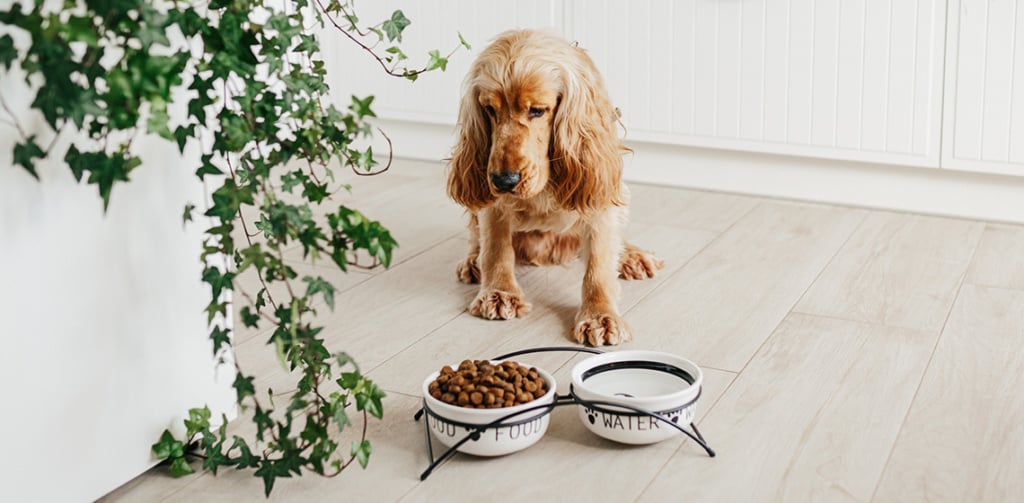Upset stomachs are common in dogs, and can be unpleasant for both us and our pets to deal with. Vomiting and diarrhea can leave our pets feeling tired and unhappy, and we hate to see them feeling unwell.
Dogs with severe upset stomachs should always be seen by a veterinarian, especially if they:
- Are vomiting many times a day
- Have blood in the vomit
- Are unable to keep food or water down
- Have a lot of watery diarrhea
- Have bloody diarrhea
- Seem quiet and withdrawn
- Have symptoms lasting longer than 2 weeks
If your dog is suffering from an upset stomach, you may consider changing their food to see if this helps them feel better. But what are the options? Is a change likely to help? Or is there a risk that it could make things worse?
Table of Contents
Should I Starve My Dog?
Common wisdom has long held that it is best to stop feeding a dog with vomiting or diarrhea for a day or two, to “let their gut settle down” and allow things to get back to normal. However, this approach is not generally recommended anymore for several reasons.
We now know that having food present in the gut is very important for your dog’s health. Most cells in a dog’s body have their energy supplied from the blood, but the cells that line the intestines get their energy directly from the food that is currently being digested.
This means that if we stop feeding our dogs for twenty-four hours, we deprive their intestines of energy. Most dogs with an upset stomach will have inflammation or damage to the intestines, which need energy to help them heal. A lack of food can actually slow the healing process and make it more likely that dogs will stay sicker for longer.
Healthy adult dogs will have good reserves of energy, and so can cope with being starved, but this is not true for other dogs.
Depriving our dogs of food can also affect the rest of their bodies. Healthy adult dogs will have good reserves of energy, and so can cope with being starved, but this is not true for other dogs. Young puppies, seniors, or those who have other health conditions may not cope well with the lack of food, and it may generally weaken them and affect how well their immune system is working. In serious cases, it can cause their blood sugar levels to become low, which is potentially life-threatening.
This means that it is not recommended to starve your dog when they have an upset stomach unless your veterinarian has specifically advised you to do so.
Should I Feed My Dog Their Regular Food?
Do we actually need to feed our dogs anything special when they have an upset stomach? Most of the time, probably not. Most commercial dog diets are fine to feed to dogs with an upset stomach, and feeding the same food will remove the risk of a diet change making things worse.
However, you may need to be more cautious if your dog is on a raw diet. Most of the time, when a dog has an upset stomach, there is a change in the levels of different bacteria in their guts, meaning that there are lower levels of the so-called “good bacteria.” These “good bacteria” are important to help fight off incoming “bad bacteria,” and so a dog who has an upset stomach may be more vulnerable to a serious infection.
Feeding a raw diet when your dog has an upset stomach may actually increase their risk of developing a more serious infection.
Raw dog food (even the frozen or freeze-dried sorts) contains much higher levels of bacteria than regular commercial dog food. Many of these bacteria can cause illness in dogs – the so-called “bad bacteria.” This means that feeding a raw diet when your dog has an upset stomach may actually increase their risk of developing a more serious infection.
There is also a small risk of a dog developing an allergy to a food that they are being fed while they have an upset stomach. If your dog’s upset stomach does not get better after 2–3 weeks, then you should speak to your veterinarian for advice.
Overall, it’s fair to say that most dogs with an upset stomach are best to continue to eat their regular food. However, dogs who are raw fed may do better to avoid the extra risk of bacteria from their food. If a dog’s upset stomach lasts for longer than a few weeks, then they may also benefit from a special diet, but this should be done under the guidance of a veterinarian.
Should I Feed My Dog A Special Diet?
There are many different diets available at the pet store that claim to be “sensitive” on dogs’ digestion, or even “hypoallergenic.” These range from serious prescription veterinary diets to cheaper alternatives that may be more spin than substance.
Some of these diets can be very useful for helping dogs with ongoing stomach problems, especially if they seem to have a food intolerance or allergy. There are also a few that can be fed short-term, and there is some evidence that they may help to speed up how quickly your dog’s upset stomach gets better. However, you still run the risk of making things worse with a change of food.
Special diets may be useful for dogs who have long-term problems with an upset stomach.
Overall, some dogs with long-term upset stomachs may benefit from a special diet, but most dogs do not need them to recover from their illness. If you think your dog might need a special diet, speak to your veterinarian for advice on choosing the right one.
Conclusion
If your dog is suffering from an upset stomach, then most of the time you can simply carry on feeding their regular food. However, you may need to try something different if your dog has a poor appetite, or is usually fed a raw diet. Special diets may be useful for dogs who have long-term problems with an upset stomach.
FAQ
Most upset stomachs will settle by themselves with time, and there is no need to change your dog’s food to do this. Your veterinarian may be able to give you medication if your dog’s upset stomach is lasting longer than normal.
It is best to continue to feed your dog’s regular food when they are unwell, unless your veterinarian instructs you differently. Changing food can actually end up making dogs’ stomach problems worse, rather than helping.
Scrambled eggs, or other easy-to-digest proteins like chicken or white fish, can be a good choice to try if your dog is not willing to eat their regular food. However, they are not likely to help your dog’s stomach get better any quicker.
If your dog has recently vomited, do not offer them any food for the next few hours. After that, offer them a small meal of their regular food. If they usually have dry kibble, try soaking it in some warm water for a few minutes to make it gentler on their stomach.

Ruth graduated from Cambridge in 2014 and has worked as a small animal GP vet ever since. She is particularly interested in internal medicine, as it combines her love of problem-solving and her somewhat geeky love of knowledge, and has completed her certificate in Small Animal Medicine. She loves animals of all species but is particularly fond of cats.








